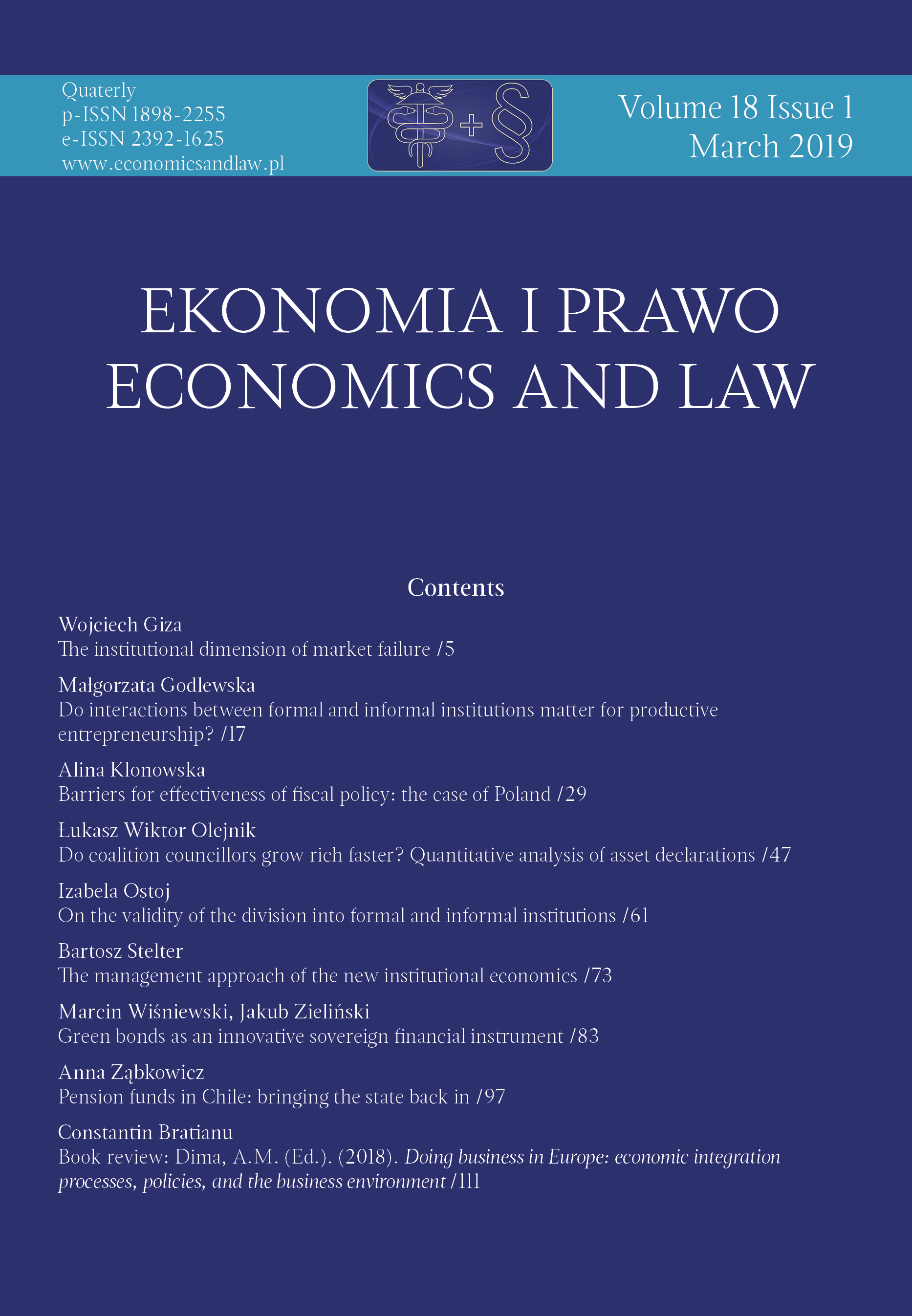Do interactions between formal and informal institutions matter for productive entrepreneurship?
DOI:
https://doi.org/10.12775/EiP.2019.002Keywords
formal and informal institutions, productive entrepreneurship, transition economies, institutional asymmetry, interplay between institutionsAbstract
Motivation: Institutional and Entrepreneurship theory pays attention to institutions and their influence on productive, unproductive and destructive entrepreneurship in transition economies. However, according to the literature, it is not only institutions that matter for productive entrepreneurship, but also the interaction between formal and informal institutions. Moreover, transition economies needs the productive entrepreneurship ‘to catch-up’ with world leaders.
Aim: The aim of this paper is to advance institutional research through the development of a better understanding of the relation between formal and informal institutions and their influence on productive entrepreneurship in transition economies like CEECs.
Results: The paper demonstrates that strong formal and informal institutions, the ‘invisible hand’ of the state, as well as the complementary and accommodating relations between formal and informal institutions are necessary for productive entrepreneurship in transition economies.
References
Acs, Z.J., Desai, S., & Hessels, J. (2008). Entrepreneurship, economic devel-opment and institutions. Small Business Economics, 31(3). doi:10.1007/s11187-008-9135-9.
Aidis, R. (2005). Entrepreneurship in transition countries: a review. Centre for the Study of Economic and Social Change in Europe Working Paper, 61.
Aidis, R. K. (2003). By law and by custom: factors affecting small and medium-sized enterprises during the transition in Lithuania. Amsterdam: Thela Thesis.
Aidis, R., Estrin, S., & Mickiewicz, T. (2008). Institutions and entrepreneur-ship development in Russia: a comparative perspective. Journal of Business Venturing, 23(6). doi:10.1016/j.jbusvent.2008.01.005.
Axelrod, R. (1986). An evolutionary approach to norms. The American Political Science Review, 80(4). doi:10.2307/1960858.
Baumol, W. (1990). Entrepreneurship: productive, unproductive and destruc-tive. Journal of Political Economy, 98(5).
Baumol, W. (1993). Entrepreneurship, management and the structure of payoffs. London: MIT Press.
Böröcz, J. (2000). Informality rules. East European Politics and Societies, 14(2). doi:10.1177/0888325400014002006.
Caree, M.A., & Thurik, A.R. (2010). Impact of entrepreneurship on economic growth. In Z.J. Acs, & D.B. Audretsch (Eds.), Handbook of Entrepreneurship Research. Second Edition. New York–Dordrecht–Heidelberg–London: Springer.
Chavance, B. (2008). Formal and informal institutional change: the experi-ence of postsocialist transformation. The European Journal of Comparative Economics, 5(1).
Chilosi, A. (2001). Entrepreneurship and Transition. MOST: Economic Policy in Transitional Economies, 11(4). doi:10.1023/A:1015216429470.
Czech, S. (2014). Institutions as enabling constraints: a note on social norms, social change and economic development. Ekonomia i Prawo. Economics and Law, 13(2). doi:10.12775/EiP.2014.023.
Feige, E.L. (1997). Underground activity and institutional change: productive, protective and predatory behaviour in transition economies. In J.M. Nel-son, C. Tilly, & L. Walker (Eds.), Transforming post-communist political econ-omies. Washington: National Academy Press.
Frye, T., & Shleifer, A. (1997). The invisible hand and the grabbing hand. American Economic Review Papers and Proceedings, 87(2). doi:10.3386/w5856.
Godlewska, M., & Pilewicz, T. (2018). The impact of interplay between formal and informal institutions on corporate governance systems: a comparative study of CEECs. Comparative Economic Research, 21(4). doi:10.2478/cer-2018-0028.
Grzymala-Busse, A. (2010). The best laid plans: the impact of informal rules on formal institutions in transitional regimes. Studies in Comparative Interna-tional Development, 45(3). doi:10.1007/s12116-010-9071-y.
Helmke, G., & Levitsky, S. (2004). Informal institutions and comparative politics: a research agenda. Pespectives on Politics, 2(4). doi:10.1017/s1537592704040472.
Hodgson, G.M. (2006). What are institutions? Journal of Economic Issues, 40(1). doi:10.1080/00213624.2006.11506879.
Lubacha-Sember, J., & Godlewska, M. (2018). The role of the local formal and informal institutions in microfirms’ development: evidence from Poland. Economics and Sociology, 11(3). doi:10.14254/2071-789X.2018/11-3/3.
McAdams, R.H. (1997). The origin, development, and regulation of norms. Michigan Law Review, 92(2). doi:10.2307/1290070.
McMillan, J., & Woodruff, C. (2002). The central role of entrepreneurs in transition economies. Journal of Economic Perspectives, 16(3). doi:10.1257/089533002760278767.
Meyer, K.E. (2001). Institutions, transaction costs and entry mode choice in Eastern Europe. Journal of International Business Studies, 31(2). doi:10.1057/palgrave.jibs.8490957.
Minniti, M. (2008). The role of government policy on entrepreneurial activi-ty: productive, unproductive or destructive. Entrepreneurship Theory and Practice, 32(5). doi:10.1111/j.1540-6520.2008.00255.x.
North, D.C. (1990). Institutions, institutional change, and economic performance. New York–Cambridge: Cambridge University Press.
North, D.C. (1994). Economic performance through time. The American Eco-nomic Review, 84(3).
Pejovich, S. (1999). The Effects of the Interaction of Formal and Informal In-stitutions on Social Stability and Economic Development. Journal of Markets & Morality, 2(2).
Peng, M.W., & Heath, P.S. (1996). The growth of the firm in planned econo-mies in transition: institutions, organizations, and strategic choice. Acade-my of Management Review, 21(2). doi:10.5465/amr.1996.9605060220.
Puffer, S. M., McCarthy, D.J., & Boisot, M.H. (2010). Entrepreneurship in Russia and China: the impact of formal institutional voids. Entrepreneurship Theory and Practice, 34(3). doi:10.1111/j.1540-6520.2009.00353.x.
Sauka, A., & Welter, F. (2007). Productive, unproductive and destructive en-trepreneurship in an advanced transition setting: the example of Latvian small enterprises. In M. Dowling, & J. Schmude (Eds.), Empirical entrepre-neurship in Europe: new perspectives. Cheltenham: Edward Elgar.
Shane, S., & Venkataraman, S. (2000). The promise of entrepreneurship as a field of research. Academy of Management Review, 25(1). doi: 10.2307/259271.
Shleifer, A., & Vishny, R.W. (1993). Corruption. The Quarterly Journal of Eco-nomics, 108(3). doi:10.2307/2118402.
Voigt, S. (2012). How (Not) to measure institutions. Journal of Institutional Economics, 9(1). doi:10.1017/s1744137412000148.
Wennekers, S., & Thurik, R. (1999). Linking entrepreneurship and economic growth. Small Business Economics, 13(1). doi:10.1023/A:1008063200484.
Williams, C.C. (2008). Beyond necessity-driven versus opportunity driven entrepreneurship: a study of informal entrepreneurs in England, Russia and Ukraine. International Journal of Entrepreneurship and Innovation, 9(3). doi:10.5367/000000008785096647.
Williams, N., & Vorley T. (2015). Institutional asymmetry: how formal insti-tutions affect entrepreneurship in Bulgaria. International Small Business Jour-nal, 33(8). doi:10.1177/0266242614534280.
Williams, N., Vorley, T., & Williams, C.C. (2017). Entrepreneurship and institu-tions: the causes and consequences of institutional asymmetry. Washington: Rowman & Littlefield International.
Williamson, C.R., & Kerekes, C.B. (2011). Securing private property: formal versus informal institutions. The Journal of Law and Economics, 54(3). doi:10.1086/658493.
Williamson, O.E. (1979). Transaction-cost economics: the governance of contractual relations. Journal of Law and Economics, 22(2). doi:10.1086/466942.
Downloads
Published
How to Cite
Issue
Section
Stats
Number of views and downloads: 1023
Number of citations: 0
